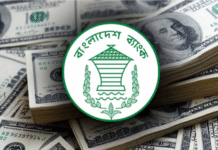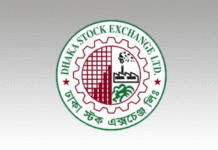
Highlights:
- Bangladesh targets $40 billion reserves
- Central bank buys $1B in dollars without currency disruption
- Reserves cover five months of imports; target is six
- Reforms planned: bank consolidation, stricter oversight of finance firms
- Remittances rose, hundi curbed; over-invoicing imports sharply declined
- Taka stabilized; central bank resists fully flexible exchange rate
The Bangladesh Bank is seeking to boost foreign exchange reserves to around $40 billion by June to help stabilize the local currency, Governor Ahsan H Mansur said.
“The market is essentially in equilibrium, and we are now building reserves from a position of strength,” Mansur told Reuters in a phone interview on Saturday. The bank has already purchased more than $1 billion in recent weeks without unsettling the taka, he added.
“Our objective is to stabilize the exchange rate, not to fix the price,” Mansur said.
Bangladesh held $31.4 billion in gross reserves as of 3 September, enough to cover about five months of imports under the central bank’s measure, or four months under the IMF’s stricter definition. Mansur said his goal was to reach six months’ coverage, regardless of whether the IMF program continues, reports Bloomberg.
A former IMF economist, Mansur took office as Bangladesh Bank’s 13th governor in August 2024 after the fall of former Prime Minister Sheikh Hasina. He said the February 2026 election would provide the political clarity needed to accelerate reforms, including bank consolidation and tighter oversight of non-bank lenders, says Bloomberg.
“My focus has been on ensuring macro stability — reserves, exchange rates and prices — while at the same time pushing through banking and financial reforms that are tough but necessary,” he said. “If we can sustain these changes for five to 10 years, the financial system will be much stronger.”
The reserve buildup comes after Bangladesh cleared nearly $4 billion in arrears to global suppliers and power companies, including India’s Adani Group, within the past year. “Within eight to nine months, we cleared everything,” Mansur said, adding that the repayments helped restore trust with correspondent banks.
He credited rising remittances and lower import over-invoicing for strengthening reserves. Stricter controls on informal hundi money transfers channeled more expatriate earnings into official flows, while imports declined even as Chattogram Port handled record container volumes. Exports rose about 9% during the same period, narrowing the current-account gap, Mansur said.
The taka has since steadied after hitting 127 per dollar last year. The central bank intervened to prevent banks from paying higher unofficial rates. “If I had allowed that, the rate would have gone to 135, then 145,” Mansur said.
Bangladesh has resisted IMF calls for a fully flexible exchange rate, pointing to risks of overshooting. “I believe in flexibility, but not in reckless overshooting,” Mansur said.









